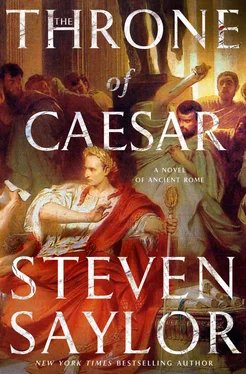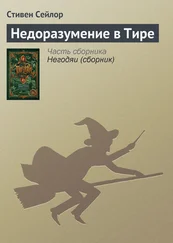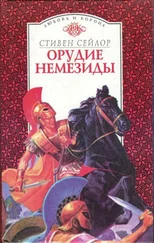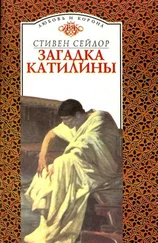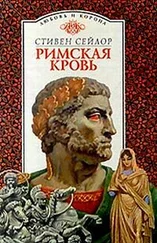Стивен Сейлор - The Throne of Caesar
Здесь есть возможность читать онлайн «Стивен Сейлор - The Throne of Caesar» весь текст электронной книги совершенно бесплатно (целиком полную версию без сокращений). В некоторых случаях можно слушать аудио, скачать через торрент в формате fb2 и присутствует краткое содержание. Год выпуска: 2018, Издательство: St. Martin's Press, Жанр: Исторический детектив, на английском языке. Описание произведения, (предисловие) а так же отзывы посетителей доступны на портале библиотеки ЛибКат.
- Название:The Throne of Caesar
- Автор:
- Издательство:St. Martin's Press
- Жанр:
- Год:2018
- ISBN:нет данных
- Рейтинг книги:5 / 5. Голосов: 1
-
Избранное:Добавить в избранное
- Отзывы:
-
Ваша оценка:
- 100
- 1
- 2
- 3
- 4
- 5
The Throne of Caesar: краткое содержание, описание и аннотация
Предлагаем к чтению аннотацию, описание, краткое содержание или предисловие (зависит от того, что написал сам автор книги «The Throne of Caesar»). Если вы не нашли необходимую информацию о книге — напишите в комментариях, мы постараемся отыскать её.
The Throne of Caesar — читать онлайн бесплатно полную книгу (весь текст) целиком
Ниже представлен текст книги, разбитый по страницам. Система сохранения места последней прочитанной страницы, позволяет с удобством читать онлайн бесплатно книгу «The Throne of Caesar», без необходимости каждый раз заново искать на чём Вы остановились. Поставьте закладку, и сможете в любой момент перейти на страницу, на которой закончили чтение.
Интервал:
Закладка:
“So you’re not a believer in divination?” I asked.
“Gordianus, how long have you known me? Second sight, soothsaying, mind-reading, fortune-telling, seers and portents and oracles—you know I have no faith whatsoever in such things.”
“So your discourse debunks divination?”
“Ruthlessly. Of course, at the end I have to express some support for it, as a tool of political expediency, in order that we may have a state religion. How did we decide to put it, Tiro?”
Tiro quoted: “‘However, out of respect for the opinion of the masses and because of the great service to the state, we maintain the augural practices, discipline, religious rites and laws, as well as the authority of the augural college.’ Of course, that refers to Roman rites of divination, not the Etruscan rites.”
That was Cicero, I thought, always slippery with words, whether arguing in the law courts or writing a scholarly treatise. He had been the same when choosing between Caesar and Pompey, waiting until the last possible moment, and then joining the losing side. That mistake had made him more cautious than ever. What did he really want from me? The moment had not yet come to press him about that. “Perhaps we might have refreshment?”
“Of course! What am I thinking, making you sit there with empty hands and empty stomachs! Tiro, can you see to that?”
Tiro nodded and slipped out of the room.
“Ah, yes, Pompey and his superstitions,” said Cicero. “Cato was quite the opposite. Cato thought that haruspices were downright disreputable, and also ridiculous, especially with those conical caps on their heads…”
I supplied Cato’s well-known quote: “‘When one haruspex passes another in the street, it’s a wonder that either one of them can keep a straight face.’”
Cicero smiled wistfully. “Alas, poor Cato, he fared no better than Pompey in the end, cornered by Caesar’s troops in Africa like some beast of prey and driven to a messy suicide. By Hercules, I must include Cato’s words somewhere in the treatise.” He reached for his stylus and tablet, then put them down. “Ah, but I’ve neglected one of my principal reasons for wanting to see you, Gordianus—to congratulate you.”
“For what?” It seemed to me I had been doing very little lately, other than sitting in my wintry garden and making an occasional excursion to the Salacious Tavern and back.
“Please, Gordianus, you needn’t be modest. I refer to the change in your status as a citizen—your elevation to the Equestrian class.”
“How in Hades do you know about that?”
“From the postings in the Forum. You know I dispatch a slave every day to peruse the lists—notifications of deaths and funerals, marriage announcements, and so on. When I was told that your name had a ppeared on the roster of new Equestrians, I was delighted for you. I won’t ask how you managed to accumulate that much wealth in the last year or two—”
“Entirely by honest means, I assure you.”
“Ah, well, there are plenty of men in Rome who got there by other ways.”
This was true. Many fortunes had been made, as well as lost, in the chaos of the civil war, often by shadowy means or outright crime. I had in fact come out of the war years better off than when they started, thanks to a particularly generous remuneration from none other than Calpurnia, for my hard work and discretion involving a matter that I had no intention of explaining to Cicero. Among Caesar’s tools for restoring order was a canvassing of wealth. My good fortune had not gone unrecorded; hence my registration in the Equestrian class traditionally made up of wealthy merchants and landowners. When formally dressed in a toga, I had the right to wear underneath it a tunic with a narrow red stripe over the shoulder not covered by the toga. By this visible red stripe all men would know me as an Equestrian. I had not yet bothered to obtain this garment. Members of the Roman Senate, a class defined more by power than wealth, wore a tunic with a broad red stripe, not a narrow one—a subtle but significant distinction.
“You should be very proud, Gordianus. When one thinks of how far you’ve come from your beginnings—”
“I’m no better a man than my father was,” I said brusquely. In fact, my father would have been delighted at my elevation in status, something he could never have dreamed of. “As far as I can see, the honor has only drawbacks. I’ll be made to pay more taxes, and serve on committees, and maybe even on juries, if the legal system ever returns to normal.”
“Have you thought of that word yet?” said Tiro, stepping back into the room. Two young female slaves followed him, one carrying a tray with pitchers of water and wine and cups, and the other carrying a tray of delicacies in silver bowls. I saw olives of many hues, dried dates and figs, and little honey cakes. Next to me I heard Davus’s stomach growl .
“What word?” I asked. “Oh, you mean that elusive Etruscan word for the universal sensation of having experienced this very moment at some previous time.”
“A universal sensation?” asked Cicero.
“Yes. Everyone experiences it.”
“Not me.”
“No?”
“I’ve no idea what you’re talking about.”
“Ah, well. Then you’ll be of no help in coming up with that Etruscan word for it. So perhaps we should move on to the reason you wanted to see me—other than congratulations on my dubious rise in the world.”
“And what would that be?” asked Cicero, raising an eyebrow and glancing at Tiro, who raised an eyebrow back at him.
“I didn’t tell him,” said Tiro. “He guessed.”
“Actually, it was Diana,” said Davus, speaking up to make sure his wife received due credit.
“Yes, Cicero,” I said, “shall we talk about the assassination of Julius Caesar?”
Cicero blanched at hearing the words spoken so openly. Was it that expression on his face, or the light in the room, or the disposition of the many-colored olives in their silver bowl, or something else altogether that caused me, in that very moment, to experience the sensation I had just been talking about? Even as those brash words left my lips, some memory of the past—or premonition of the future—caused me to shiver and feel an icy chill down my spine.
IV
Cicero took a deep breath. “If you already know so very much, Gordianus, perhaps you also know about the warning that Spurinna the haruspex delivered to Caesar less than a month ago.”
“I’ve heard the story,” I said. In fact, my son Meto had told me, scoffing at every detail. It was on the first day the Dictator appeared in public wearing purple robes and a laurel crown, seated on an ornately gilded chair. He had been voted these unprecedented honors by the Senate. No man had worn purple and sat on a throne in the Forum since the last of the hated kings was driven out and Rome became a republic, more than four hundred years ago. The Dictator’s regal trappings overshadowed the actual event, a religious rite at which an ox was sacrificed on the altar. The newly appointed senator Spurinna, as presiding haruspex, examined the entrails and other organs. He was unable to find the heart. A sacrifice without a heart boded ill, he said. The very heart of the Roman state, Caesar, was in danger, and would be so for the next thirty days.
“Spurinna warned Caesar to be on his guard until the Ides of March,” I said.
“Yes,” said Cicero, “the omen foretold a month of danger—a period that will end just before Caesar leaves Rome for the Parthian campaign. Well, that only makes sense. The greatest dangers to Caesar must be here in the city, where his surviving foes have all come home, now that the civil war is over. Once he leaves for Parthia with his devoted companions, he leaves behind anyone who might wish him harm.”
Читать дальшеИнтервал:
Закладка:
Похожие книги на «The Throne of Caesar»
Представляем Вашему вниманию похожие книги на «The Throne of Caesar» списком для выбора. Мы отобрали схожую по названию и смыслу литературу в надежде предоставить читателям больше вариантов отыскать новые, интересные, ещё непрочитанные произведения.
Обсуждение, отзывы о книге «The Throne of Caesar» и просто собственные мнения читателей. Оставьте ваши комментарии, напишите, что Вы думаете о произведении, его смысле или главных героях. Укажите что конкретно понравилось, а что нет, и почему Вы так считаете.
